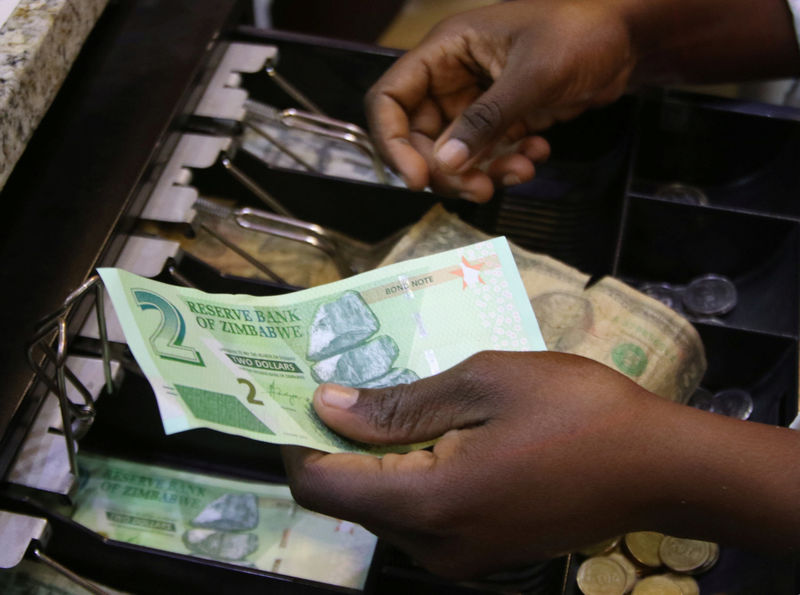By MacDonald Dzirutwe
HARARE (Reuters) - After defying economic gravity for a year, Zimbabwe's homemade U.S. dollars have fallen to earth with a bump.
Rumors the central bank was buying up black market U.S. dollars last month with one of its own versions of the currency created panic in a country scarred by the hyperinflationary spiral of 2008 that wiped out people's savings.
The worthless Zimbabwe dollar was replaced by the U.S. dollar in 2009 but the economy has struggled over the last 18 months because of a massive domestic shortage of greenbacks.
As a result, cash, especially crisp, new, $100 bills, has enjoyed a steady 10 percent to 20 percent premium over dollars stored electronically in bank accounts - nicknamed "zollars".
(For graphic on implied rate of Zimbabwe's electronic dollars click: http://fingfx.thomsonreuters.com/gfx/rngs/ZIMBABWE-DOLLARS/0100409Q0MV/index.html )
But two weeks ago, the rumors that even the central bank had run out of hard currency sent the premium soaring to nearly 50 percent, according to black market traders and unofficial measures of the zollar value.
"I am really scared that I will wake up one day and find my money in the bank is worthless," said Jethro Nkosi, a computer technician at a hotel in the capital Harare.
The central bank has not published currency reserves since dollarisation and Zimbabweans worry it is creating zollars without the backing of sufficient reserves or gold, leaving the system vulnerable to a crisis of confidence.
Another currency implosion would also be a major headache for 93-year-old President Robert Mugabe as he seeks to extend his 37 years in power in an election in less than a year.
On Friday, buying $100 in cash via a bank transfer cost 145 electronic zollars, a marginal improvement on 160 last week. But on Sept. 23, when rumors of the central bank buying black market dollars swept Harare, the rate spiked to 185.
The price of everyday goods has also leapt as importers of food to fuel to medicine are forced to turn to an increasingly unfavorable and risky black market to pay for their wares.
In just one week, the cost of cooking oil, cereal and butter imported from South Africa leapt by as much as 30 percent.
DOLLARS BOLLARS ZOLLARS
One Harare banking source said the Reserve Bank of Zimbabwe's (RBZ) Fidelity Printers and Refiners division sparked the panic two weeks ago by offloading a large quantity of dollar "bond notes" to buy gold from small-scale mining firms.
When the newly minted notes, nicknamed "bollars", hit the streets, currency dealers assumed the central bank was mopping up greenbacks from the black market, sending the value of real dollars soaring.
Bond notes are the third form of dollars used in Zimbabwe, besides cash and zollars. Like their electronic counterparts, the quasi-currency notes are meant to be equivalent to dollars issued by the U.S. Federal Reserve but they are now worth less.
The notes, backed by an opaque $200 million loan facility from the Cairo-based Afreximbank, were first introduced in November. This week they were trading at 1.3 to the dollar after weakening to as much as 1.5 in late September.
The banking source said RBZ's Fidelity, Zimbabwe's sole gold trader, was paying mining firms for gold 60:40 in dollars and bond notes, compared with only dollars a month ago - and that had fueled suspicions the RBZ was running out of hard currency.
Reserve Bank of Zimbabwe Governor John Mangudya denied Zimbabwe was locked in another currency crisis. He told Reuters the bank was spending $1 million in bond notes a week to buy gold but said that should not affect currency market values.
"In an economy with $180 million of bond notes, I am not very sure whether that amount could have been responsible for a few days' change in economic fundamentals of premiums in the parallel markets," he told Reuters.
CARS, HOUSES AND STOCKS
However, the situation is febrile and fluid.
To try to prevent a run on the domestic banking system, the government has tried to kill the black market with decrees giving the police more powers and stating that illegal currency traders face up to 10 years in prison.
Despite the warnings, illegal currency dealers continue to trade on Harare's streets, albeit more discretely than usual because of plain-clothes police lurking in the shadows.
"This is the only way I can look after my family. But it will now be difficult to trade openly like we used to do," said currency trader Theresa Chirwa, glancing over her shoulder as she shoved a wad of bond notes and dollars into her satchel.
Assessing the true value of zollars is difficult but economists have revived a gauge used during the hyperinflation era - the Old Mutual Implied Rate - which compares share prices of the Old Mutual insurance firm traded in Harare and London.
As the central bank rumors swirled last month, the premium for Harare shares over their London counterparts surged, meaning Zimbabweans need far more of their electronic dollars to buy the shares than someone in London using ordinary U.S. dollars.
Besides trying to get their hands on hard cash, Zimbabweans are also converting zollars into tangible assets such as cars or property, or piling into the stock market in the hope shares will hold value even if their bank balances are obliterated.
As a result, Zimbabwe's main stock index, the ZSE Industrial (INDZI), has surged 77 percent in the last month to a record high of 433 this week. The index has tripled so far this year.

"I'm investing in equity funds - hopefully that should give me some value for my money," said Nkosi, the computer technician. "We don't know what tomorrow holds."